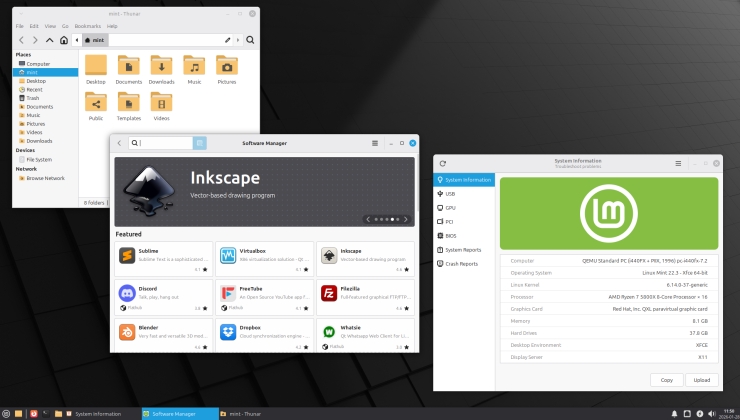HTC has recently announced that the HTC Vive PRO HMD is now available to pre-order with shipping expected in April, on top of that the normal Vive has seen a price drop.
Ready for the PRO price, it's an eye-watering $799/£799. This price only includes the headset as well, so you don't get any controllers, base stations or the VIVE wireless adapter.
The PRO has been through a bit of a redesign when it comes to the cushions on your face, to block out more light. It's also seen a resolution bump to 1440 x 1600 pixels per eye (2880 x 1600 pixels combined) versus the 1080 x 1200 pixels per eye (2160 x 1200 pixels combined) in the standard model. It also has built-in headphone, so that's one less wire to fuss about with.

Direct Link
As for the classic Vive, it's seen a drop in price down to $499/£499 making it quite a bit more enticing, although you still need a good PC on top of that to handle it of course.
For Linux gamers, I'm not sure if makes much sense picking one up right now. Not only is Linux VR support still quite raw, there's not a great deal of titles available.
More info on the Vive PRO and Vive here.
https://github.com/roothorick/WineOpenVR
The latest plan seems to be to interface with DXVK and Linux SteamVR directly, thus cutting much of the WINE overhead and latency for hopefully a near native VR experience on Linux through DX11 games with WINE.
Then I'll game the sh*t out of everything we got for VR so far :)
Yeah, early adopter problems... I also think that if you do roomscale VR the higher resolution of the Vive Pro doesn't really matter. When moving around the current (low) resolution is not realized anymore after some seconds ingame. For seated titles it's different. Here you might look at one spot for a longer time, so it's more easily to see the grid of the display.
Nevertheless, there are some pretty cool games working on Linux already, e.g. Croteam's Serious Sam and Talos Principle VR titles. Some little titles like Munch VR and Locomancer work. Even EVERSPACE was working before the last update.
Of course that's not much compared to what's already available for VR in general. But it's a start, and VR is a niche in PC gaming while VR on Linux is a niche within the VR niche... nicheception!
Let's see how the three VR titles Valve hinted to be working on turn out. I hope the release of these will mark VR on Linux as stable. On the other hand Valve's "The Lab" is (still?) not out for Linux VR...
Last edited by Corben on 27 Mar 2018 at 11:36 am UTC
Quoting: CorbenI'm still thinking about getting the Vive Pro. It really is a heavy price, especially compared to getting just the HMD with the connector box and not a complete bundle. So it's targeted for owners of the original Vive as an upgrade. Getting a complete bundle would put another 300€ for 2 base stations and another 290€ for two Vive controllers on top of the price of the Vive Pro. Man, that accessories is as much money as the old Vive bundle.I was already discussing that with someone that already has the vive...
But buying his vive would still mean I need to buy the accessories, which has the same price as just a vive (599.96 euro for the accessories vs 599.00 for a complete set).
It does have an advantage that vive owners probably can buy a second vive for cheap, and have 2 VR setups working at the same time... You just need a pair of extra controllers and another PC, as the base stations just need to be there.
Last edited by Ardje on 27 Mar 2018 at 11:48 am UTC
Also, the Vive Pro is going to need really high end graphics card(s) driving it to avoid motion sickness.
Quoting: mike44The Samsung Odyssey has the same resolution but about half the price.But has absolutely no Linux support and very little chance of ever getting it (being a Windows Mixed Reality headset).
Quoting: JuliusI think you can use it with Steam VR, but I'm not sure how that translates into Steam VR on Linux.Quoting: mike44The Samsung Odyssey has the same resolution but about half the price.But has absolutely no Linux support and very little chance of ever getting it (being a Windows Mixed Reality headset).
But the Odyssey does the inside out tracking, which isn't as awesome as the Vive.
I'd get the Vive Pro if it were like 600, but 800 is just too much for just the headset...
I mean if there were a market out there for selling just the headset to recoup some of that money... but there isn't.
Quoting: JuliusYeah, VR on Linux is sadly held back mainly by a lack of compatible games.You can't have anyone taking it seriously, until this will be ready: https://www.khronos.org/openxr
Otherwise developers will be wasting their time chasing tons of incompatible APIs. And then, there is a question of FOSS implementation of actual runtime.
Last edited by Shmerl on 27 Mar 2018 at 3:07 pm UTC
Although I must admit that VR and X-Plane 11 looks like a killer combination. But we're still talking a niche application.
I recently picked up a budget knockoff of the Google Cardboard VR, and wow... Honestly, until you try it, it's hard to get excited about it - and the Cardboard VR is a bloody brilliant way to get on board. So I've gone and ordered a Samsung Gear VR to tide me over until I'm allowed to purchase a Vive.
Y'all should get a Google Cardboard and have a play.
It may be hard to raise us above 1% in sales in general, but if many Linux-exclusive gamers buy VR headsets, it would be easy to make us say 20% of VR market. That would be good for us.
We are at a point in history when we are not affected (much) by the chicken&egg problem w.r.t to VR. Not buying headsets because there are few games will only make sure this problem will become a reality for VR as well.
I would encourage people to buy headsets if I were you, Liam.
Quoting: ShabbyX> For Linux gamers, I'm not sure if makes much sense picking one up right now. Not only is Linux VR support still quite raw, there's not a great deal of titles available.I did not think of it that way. But that's a good idea.
It may be hard to raise us above 1% in sales in general, but if many Linux-exclusive gamers buy VR headsets, it would be easy to make us say 20% of VR market. That would be good for us.
We are at a point in history when we are not affected (much) by the chicken&egg problem w.r.t to VR. Not buying headsets because there are few games will only make sure this problem will become a reality for VR as well.
I would encourage people to buy headsets if I were you, Liam.
The problem with the current vive though is that it has no hardware adjustable IPD (2 screens).
But if the price drop is ok..
Quoting: ShmerlGREAT, now we have 3 competing standards...Quoting: JuliusYeah, VR on Linux is sadly held back mainly by a lack of compatible games.You can't have anyone taking it seriously, until this will be ready: https://www.khronos.org/openxr
Otherwise developers will be wasting their time chasing tons of incompatible APIs. And then, there is a question of FOSS implementation of actual runtime.
https://github.com/ValveSoftware/openvr
http://www.osvr.org/what-is-osvr.html
https://www.khronos.org/openxr
the question is wich one should be followed?
Quoting: elmapulGREAT, now we have 3 competing standards...Seeing as both Valve and the big players behind OSVR are involved in OpenXR, I'd say it's a safe bet. But it's early days and the standard isn't there yet.
https://github.com/ValveSoftware/openvr
http://www.osvr.org/what-is-osvr.html
https://www.khronos.org/openxr
the question is wich one should be followed?
Besides, this kind of fragmentation always happens with new tech.
Quoting: ShabbyXI would encourage people to buy headsets if I were you, Liam.I am suddenly thinking that it's easily fixed by:
for i in $(seq 1000 9999); do useradd steam$i;done
and start steam for each user, and use their e-mail addresses for new steam accounts... :-)
Quoting: ArdjeI am suddenly thinking that it's easily fixed by:To make active users, they need to actually spend some money AFAIK.
for i in $(seq 1000 9999); do useradd steam$i;done
and start steam for each user, and use their e-mail addresses for new steam accounts... :-)
(And you need to raise the number to make a difference.)
Quoting: elmapulGREAT, now we have 3 competing standards...I think only OpenXR is a collaborative effort, so the answer is obvious.
https://github.com/ValveSoftware/openvr
http://www.osvr.org/what-is-osvr.html
https://www.khronos.org/openxr
the question is wich one should be followed?











 How to setup OpenMW for modern Morrowind on Linux / SteamOS and Steam Deck
How to setup OpenMW for modern Morrowind on Linux / SteamOS and Steam Deck How to install Hollow Knight: Silksong mods on Linux, SteamOS and Steam Deck
How to install Hollow Knight: Silksong mods on Linux, SteamOS and Steam Deck